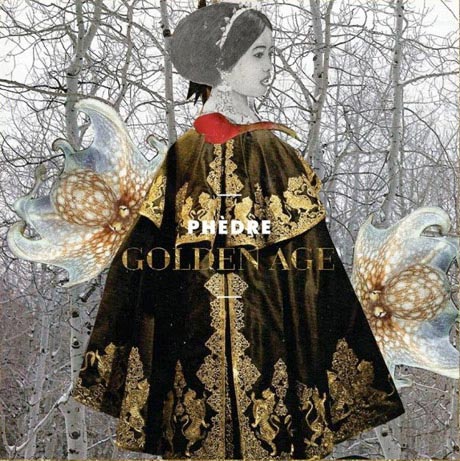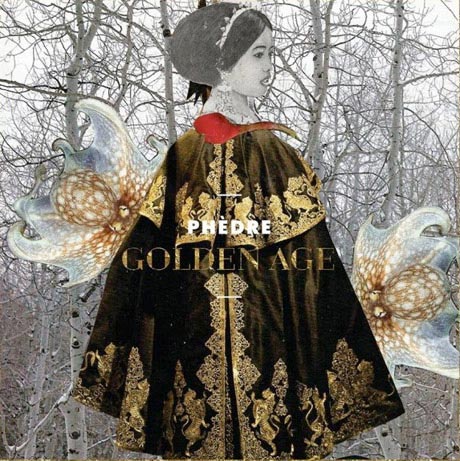Golden Age
DAPS / Discos Tormentos (2013)
Blurred, mildly distorted, catchy and strange, like a reflection of the past viewed through a dirty martini glass, Golden Age is a collection of playful tracks from musicians with a clear idea of what they want to achieve. Inspired, loosely, by the Greek mythological story of Phaedre and the track “Some Velvet Morning” by Nancy Sinatra and Lee Hazelwood, Phèdre have produced a body of work that is often beguiling and sometimes enchanting.
Incorporating a palette of sounds that is complementary and wide-ranging, this album is a kaleidoscopic journey into what is now possible and what was once probable. Reminiscent of the work of EAR PWR and Supertalented, you can also hear the electronic strangeness of The Residents coexisting alongside the rough cowboy and the vulnerable girl interplay of Nancy Sinatra and Lee Hazlewood. Add to this the San Francisco psychedelia of Fifty Foot Hose, one of the first bands to combine rock and experimental music, and you have an idea of what to expect from Phèdre.
The production and sound of Golden Age resembles that of a dusty old music cassette that has been found after many years on a windowsill in the sun: notes warble and sounds merge; slight distortion fuzzes melody lines and clogs vocal harmonies. The track “Sunday Someday” emerges from the brief silence between the tracks in a way only found on cheap tapes bought from garages and service stations in the 1970s — a manner that typifies the pleasurable attention to sonic detail throughout.
In Greek mythology, the tale of Phaedra is one of love and deception that eventually led to the suicide of a guilt-ridden Phaedra. There is none of this hysteria or frantic drama on Golden Age. Instead you hear a detached and humorous exploration of ideas that have appealed to Daniel Lee, April Aliermo and friends.
Based around a core of bouncing bass and wobbling synths, the imaginatively conceived and treated vocals wind in and out, often calling and answering to each other. Through this the listener is witness to a dialogue that is obscure and unusual, as indecipherable lyrics, audible then inaudible, offer a glimpse of a world of indistinct and uncertain mythologies. Though these are not, perhaps, the mythologies one might assume from their name and their talk of ancient Greece.
Phaedre came into being in an attic in Toronto over three late summer nights and numerous bottles of cheap wine. This kinship and camaraderie, still there in the music of this new album, is what makes it an enjoyable listen. Although it was written and recorded over the gloomiest of winter months in Berlin, a feel of the city that gave us some of Bowie’s most sombre yet potent compositions is absent. Instead what we have is a markedly different soundscape, one absorbed by shiny retro impressions and light-hearted puns that offers an “every-city” experience that is essentially a 21st Century worldview with its own repotted and reconstituted past. This is a Berlin like any other city on the homogenised network of global cities, where all cultural experience is shared and the same.
Phèdre have given us their own view of an era when rockets went to the moon and the world stood on the edge of atomic oblivion. Through their music they evoke an age when glossy lifestyle images presented a politicised shopwindow of easy consumerism and high tech advancement to an alternative political system as war by another means. In doing this they remind us that, with each pass and replay, with each generation’s reinterpretation, that the original becomes fainter and more blurred and loses yet more of its original potency and meaning.
Ω







